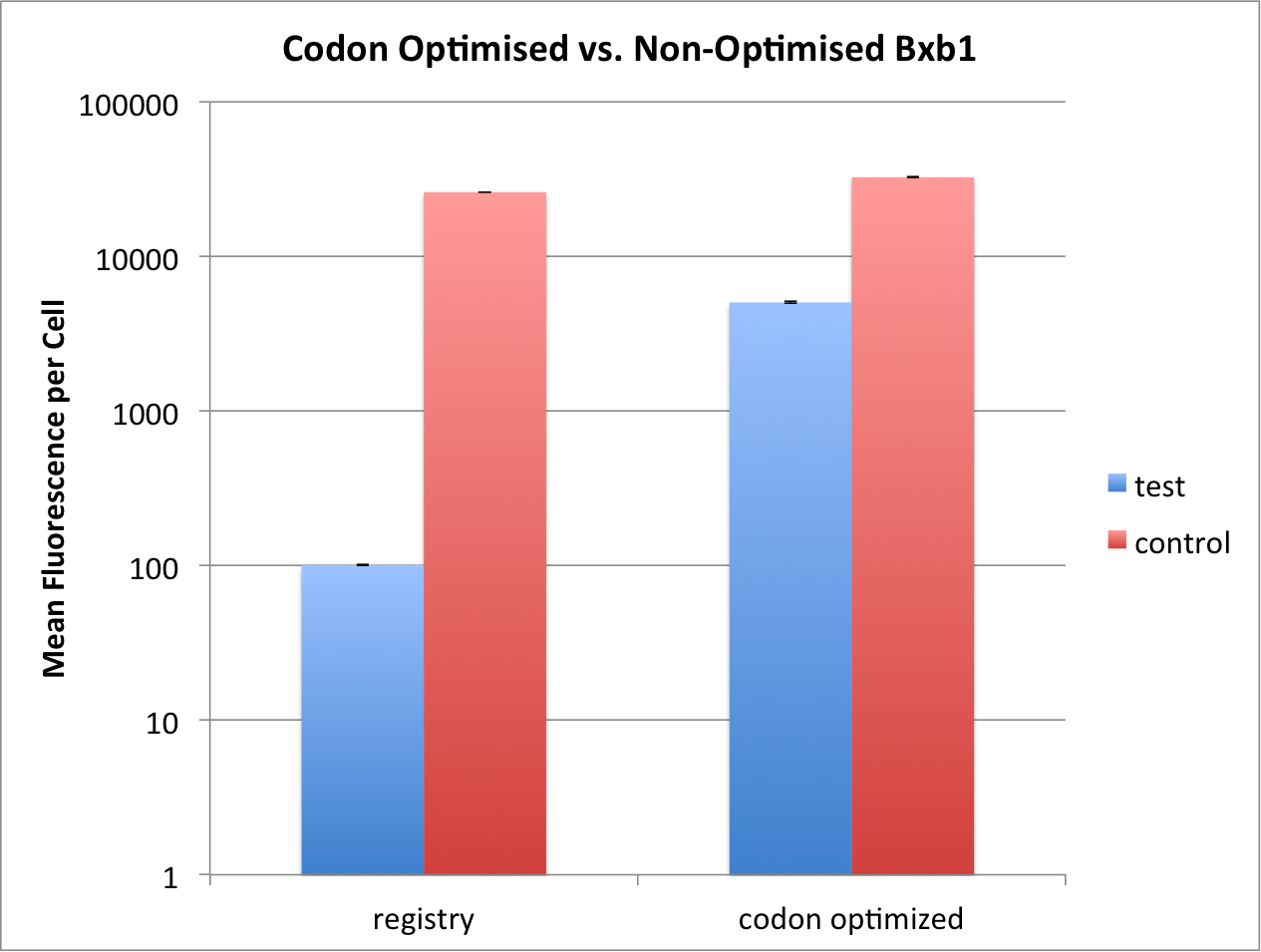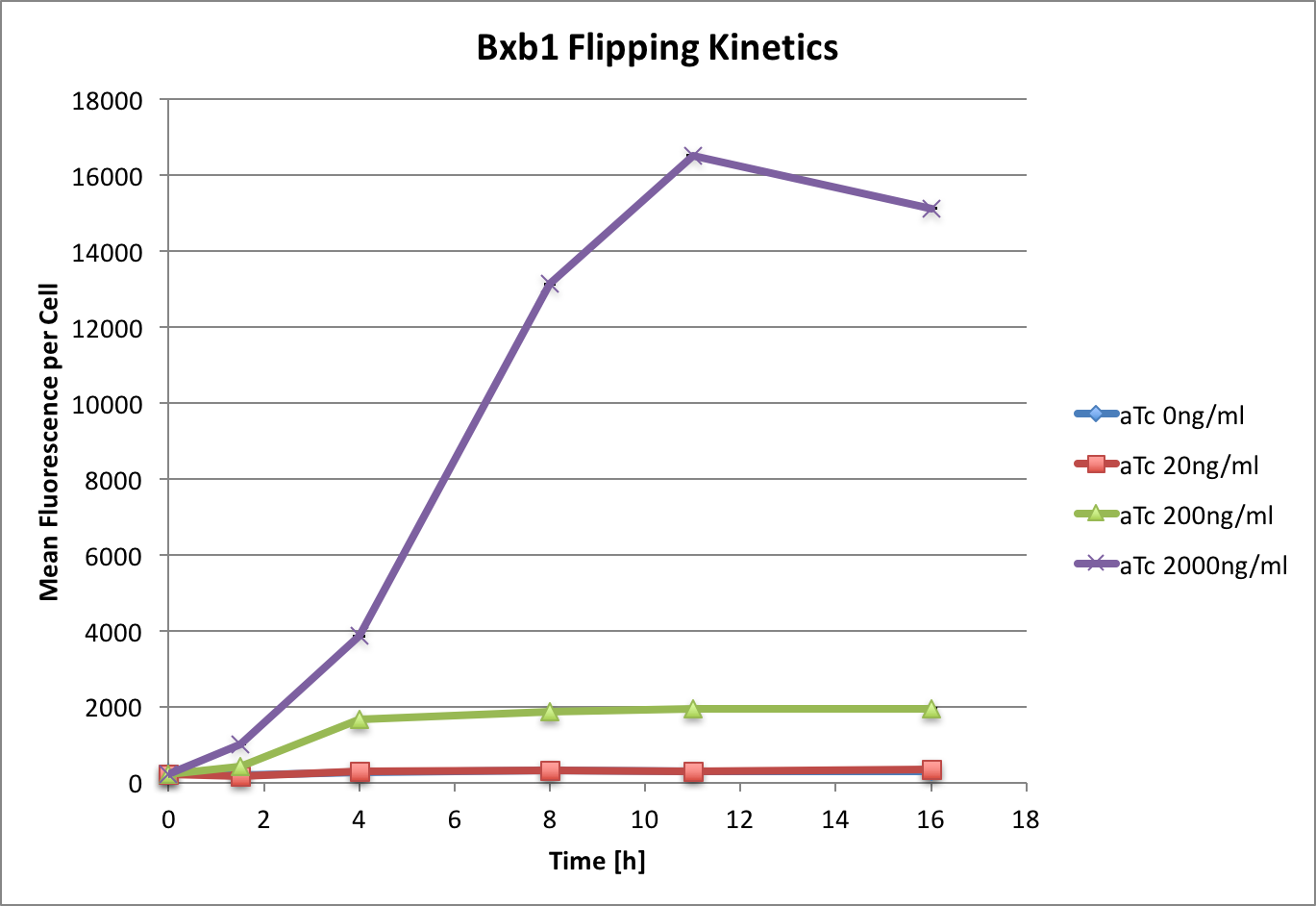Part:BBa_K2116026
bxb1 integrase
Biological Characterisation
Bxb1 is a phage integrase that mediates unidirectional site-specific recombination between two DNA recognition sequences, the phage attachement site, 'attP', and the bacterial attachment site, 'attB'. This recombination event is hereon referred to as a flip. Bxb1 belongs to the family of serine integrases and uses a catalytic serine for strand cleavage, recognizes shorter attP sequences, and does not require host cofactors. It mediates efficient site-specific recombination between two different sequences that are relatively short yet long enough to be specific on a genomic scale. These properties make Bxb1 an efficient tool for creating genetic logic gates, as demonstrated in various papers.
Kinetic Characterisation
We used a reporter construct Part:BBa_K2116024 with a promoter flanked between attB and attP sites Part:BBa_K2116021. Thus, we could investigate the kinetics of Bxb1 using flow cytometry (BD LSR Fortessa SORP) on time course samples.
Genetic Design
- Bxb1 was expressed under a tet promoter, without any degradation tag Part:BBa_K2116056. The RBS has a strength of 1209.69 au (translation initiation rate), as calculated by the Salis Lab RBS Calculator[1]. This construct was cloned on a medium copy plasmid with the p15A replication of origin and Chloramphenicol resistance.
- TetR was expressed under the control of medium-strength constitutive promoter Part:Bba_J23118, and cloned onto a low copy plasmid with pSC101/Rep101 replication of origin and Kanamycine resistance.
- We applied a dual fluorescence reporter system Part:BBa_K2116024 that expresses sfGFP Part:BBa_K2116017 when Bxb1 flips a directional promoter. In the non-flipped state the reporter expresses the red fluorescent protein mNectarine Part:BBa_K2116016.
Experimental Setup
- The test construct with bxb1 (pBR322/rop replication of origin and Ampiciline resistance) was transformed in E. coli TOP10 together with the reporter construct, and either with TetR or with the empty backbone as control.
- TOP10 cells were grown in LB medium (containing Kanamycine, Ampiciline (50 µg/ml) and Chloramphenicol (34 µg/ml)) for 4 hours, and then transfered to minimal M9 medium (containing 0.4% glucose, supplemented with L-leucine, L-isoleucine, and L-valine, Kanamycine, Ampiciline (25 µg/ml and Chloramphenicol (17µg/ml)) with a 1:100 dilution and grown over-night. The culture was again diluted 1:100 in minimal M9 medium the next day. aTc (anhydrotetracycline) was added at given concentrations at OD6000.5. Samples were taken at the specified time points, spun down and resuspended in PBS at OD600 0.01 and kept on ice until measurement.
- Results are presented as mean fluorescence per cell and the standard error of the mean.
Results
We observed that maximum flipping (which we defined as the flipping reached by the used positive controles) is reached at around 11 hours under these conditions. The response correlates with aTc concentration. However, compared to the control, where there is no TetR, we see 6-fold less flipping. This could be improved by increasing the concentration of aTc, however we have found that at 8000 ng/mL cell growth was inhibited.
Comparison between Codon Optimised and Registry Bxb1 Integrase
We compared the kinetics of our codon optimised Bxb1 Part:BBa_K2116026 and the one found previously on the registry Part:BBa_K907000 that was not codon optimized. The same genetic and experimental setup was used as above. The only difference between the two constructs is that the non-codon optimised bxb1 has a weaker RBS, with a strength of 251.82 au (translation initiation rate) [1]. Due to this difference in construction we compared each Bxb1 to its own control (see above, Experimental Setup).
We could show that the codon optimised Bxb1 could reach 85% of maximal flipping, whereas the non-codon optimised one reached only 0.4% after 16 hours of aTc exposure. We thus argue that the codon optimized Bxb1 seems to be more efficient, however, the influence of the different RBS strengths was not properly examined.

References:
- [1] Salis, Howard M., Ethan A. Mirsky, and Christopher A. Voigt. "Automated design of synthetic ribosome binding sites to control protein expression." Nature biotechnology 27.10 (2009): 946-950.
- 10COMPATIBLE WITH RFC[10]
- 12COMPATIBLE WITH RFC[12]
- 21COMPATIBLE WITH RFC[21]
- 23COMPATIBLE WITH RFC[23]
- 25COMPATIBLE WITH RFC[25]
- 1000COMPATIBLE WITH RFC[1000]
Sequence and Features
| None |

